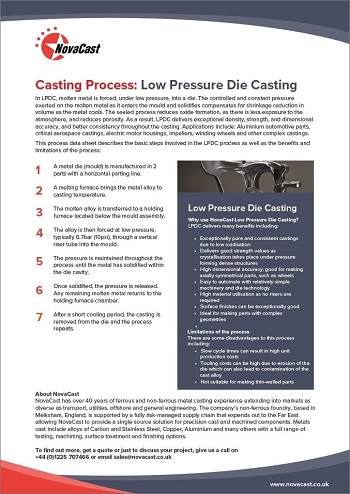Low Pressure Die Casting
Low pressure die casting is a method of production that involves molten metal being forced, under low pressure, into a die rather than relying on gravity to fill a mould as is the case with sand, investment, and gravity die casting. Modern adaptations to the pressure casting process have resulted in both low and high pressure variants that each exhibit different characteristics.
In low pressure die casting, the controlled and constant pressure exerted on the molten metal as it enters the mould and solidifies compensates for shrinkage reduction in volume as the metal cools. The sealed process also reduces oxide formation, as there is less exposure of molten metal to the atmosphere and reduces porosity. As a result, low pressure die castings deliver exceptional density, strength, and dimensional accuracy, and better consistency throughout the casting.
Typical applications for low pressure die casting includes: Aluminium automotive parts including wheels, cylinder heads, blocks, manifolds and housings, critical aerospace castings, electric motor housings, impellers, winding wheels and other complex castings.
Compare Gravity & High Pressure Die Casting
An article on the differences between pressure and gravity die casting…
Why use NovaCast Low Pressure Die Casting?

Low pressure die casting delivers many benefits including:
- Exceptionally pure and consistent castings due to low oxidisation
- Delivers good strength values as crystallisation takes place under pressure forming dense structures
- High dimensional accuracy; good for making axially symmetrical parts, such as wheels
- Easy to automate with relatively simple machinery and die technology
- High material utilisation as no risers are required
- Surface finishes can be exceptionally good
- Ideal for making parts with complex geometries
Limitations of the process:
There are some disadvantages to this process including:
- Slow cycle times can result in high unit production costs
- Tooling costs can be high due to erosion of the die which can also lead to contamination of the cast alloy
- Not suitable for making thin-walled parts
To discuss your requirements, call a member of NovaCast’s team on +44 (0) 1225 707466, send us a message here or email sales@novacast.co.uk.